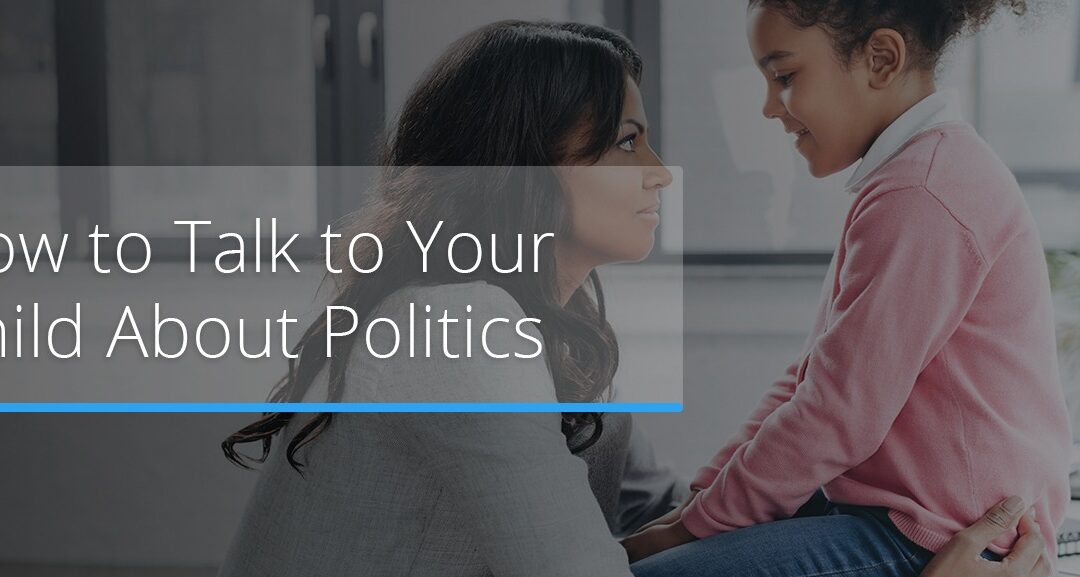Have you started teaching your child about politics? A 2016 survey found that only 10 percent of parents believe that any age is a good age to discuss politics with children. That means a lot of parents are waiting until their children are older to start talking. We get it. In today’s world, discussing politics with adults is intimidating enough. The idea of tackling the topic with children — especially younger ones — can seem even more daunting. However, there’s never been a more important time to teach kids about politics. Long before they’re old enough to vote or have opinions about legislation, it’s important that kids begin to understand how their communities operate. If their parents don’t teach them, then they’re going to develop their own thoughts and opinions based on the books they read, the media they consume, and the friends they engage with. So how can parents talk to kids about politics? The first thing adults need to realize is that politics is about more than identifying with a certain political party. It’s about developing a set of beliefs and practices that inform how we act and engage in the world we live in. Rather than avoiding the topic of politics, parents actually have a unique and important opportunity to help shape their children’s thoughts and actions for decades to come.
5 Things to Consider When Teaching Children About Politics
When adults think about politics, the first thing that comes to mind is likely the party or philosophy that they personally identify with. But when parents are speaking with children about politics, political parties fall far down on the list of important topics to cover. Take a look at these five tips for talking to kids about politics.
1. Model Civic Engagement
“Civic engagement” is a fancy term used to describe the active interest a person shows in their community. Civic engagement can happen at the local, state, and national levels. This interest can be displayed through political and non-political means, including volunteering, voting, and activism. For some adults, civic engagement can become a career, working for government organizations and community leaders who are committed to making a difference. Civic engagement — and the conversations it prompts — is typically centered around a set of core beliefs or ideas about how the world around you should work. For most children, civic engagement may initially be driven by their parent’s interests and activities. For example, a parent who is passionate about conservation will naturally instill that interest in their child as they work to clean up trash in a park or plant trees at a nearby school.
2. Teach Digital Literacy
Thanks to the 24/7 nature of technology, kids of all ages are bombarded by the media and information about politics. However, children don’t typically have the knowledge or experience to analyze these commercials to determine who is telling the truth. In fact, misleading ads can be downright scary for children. A parent’s natural instinct may be to avoid having their child view these ads, but that isn’t always a practical solution. Rather than working to avoid these messages, parents can use them to create teachable moments. When a child views a political ad, especially one that is untrue or misleading, parents can encourage critical thinking about the ad and its messages. Ask questions like:
- Who created the ad?
- What do they want you to believe?
- How can you learn more?
These are all great questions to prompt kids to think beyond the content of the message itself. Parents can also encourage older children to spend time researching both sides of an issue to determine which candidate is more truthful and how that truth aligns with their own beliefs.
3. Define Family Values
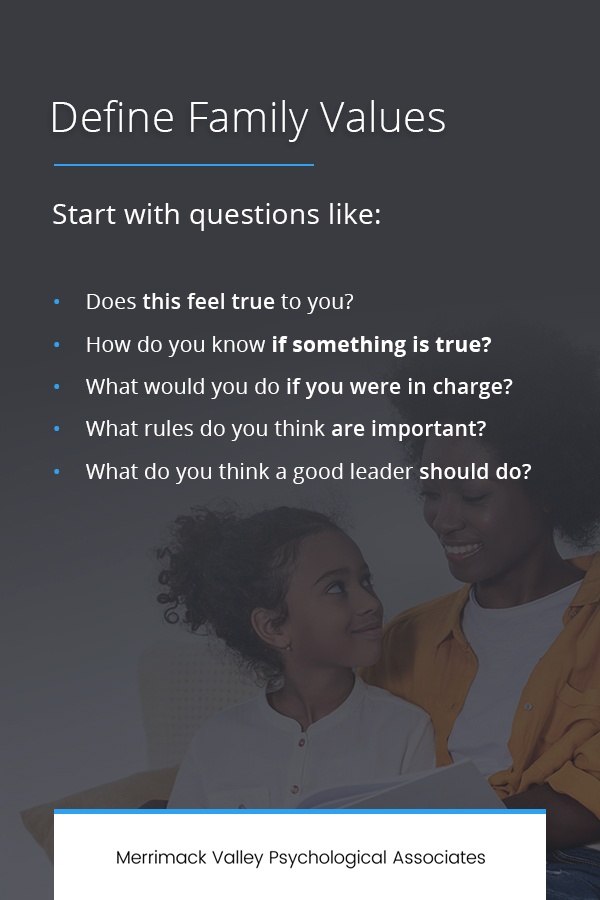
- Does this feel true to you?
- How do you know if something is true?
- What would you do if you were in charge?
- What rules do you think are important?
- What do you think a good leader should do?
4. Encourage Children to Participate
Just because they can’t vote doesn’t mean that kids don’t have a voice. Modeling civic engagement and encouraging children to develop opinions isn’t enough. Kids of all ages need to participate in the process to show them that they can make a difference. Besides educating children on how the political system works, teaching them to act on their beliefs also gives them a sense of control and empowers them to understand that one person can make a difference. As children become aware of what’s going on around them, parents can encourage them to speak up about injustice or something they would like to see changed. Kids can write or email their political representatives just as adults can. They can volunteer with an organization making a difference in important issues, such as poverty or racism.
5. Teach Them to Look at Both Sides of an Issue
In today’s current political climate, it’s easy to forget that politics is about people. Adults have the bad habit of vilifying people who disagree with them. But just because someone has a different idea or opinion doesn’t make them a bad person. When teaching children about the beliefs and issues that make up our political system, it’s important to help them understand that there are two sides to every story. Acknowledging that there is more than one way to think about things teaches children to consider other opinions besides their own. And understanding the values and priorities driving other people goes a long way in teaching children empathy and understanding of the people in their community. Most adults have strong political opinions, which can make it hard to teach children that there are two sides to every story. Although it can be tempting, avoid bad-mouthing people you disagree with in front of your kids. Why? The anxiety many adults feel about politics and the division in our country is too much to put on younger minds. Children cannot process all of the negativity that adults often associate with politics. While you may not be able to prevent a child from seeing a negative political ad or finding out about an act of violence toward a political cause or figure, you can demonstrate to them that negativity does not create productive change in the community. Instead, keep the focus on the positive ways they can contribute.
When Should I Teach My Child About Politics?
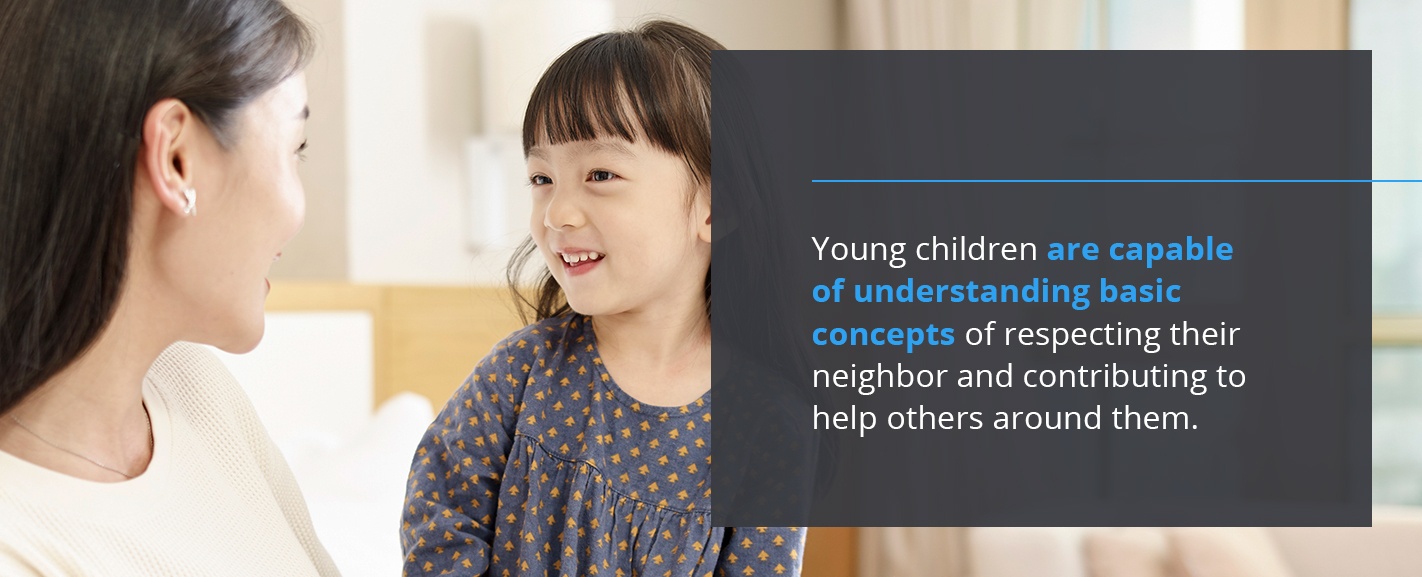
Talking to Elementary School Kids About Politics
When it comes to how to talk to children about an election, a good place to start with elementary-aged children is the voting process. Explain that voting is a way for people to make their voices heard and to choose leaders and ideas to govern our country. Then, let them put that knowledge into practice. If it’s election season, allow them to accompany you to a polling location. At home, call for family votes on things like what game to play on Friday night or what to have for dinner on the weekend. Engaging in local causes is also a great way to help kids understand politics. Feeding the homeless, cleaning up a park, and volunteering with a local charity can all show children how to give back to their community. It also sets the stage for parents to talk with children about topics such as environmentalism, caring for the poor, and education. Elementary-age children are old enough to begin to understand the idea of a political party system, but at this young age, it’s a good idea to keep the emphasis on community engagement and developing a belief system rather than dividing into specific groups. Teaching them to evaluate political messaging and identify truth is also important at this phase. That way, they can later learn to discern fact from fiction in political messaging. There are a number of age-appropriate books available for children to read about the political process, but experiencing it firsthand is a better way to drive the point home. Visit historical or political sites, such as your state’s capitol building. Viewing a political debate on TV or attending a rally for a particular cause can also show children how to interpret information and build their own view of the world around them.
Talking to Middle Schoolers About Politics
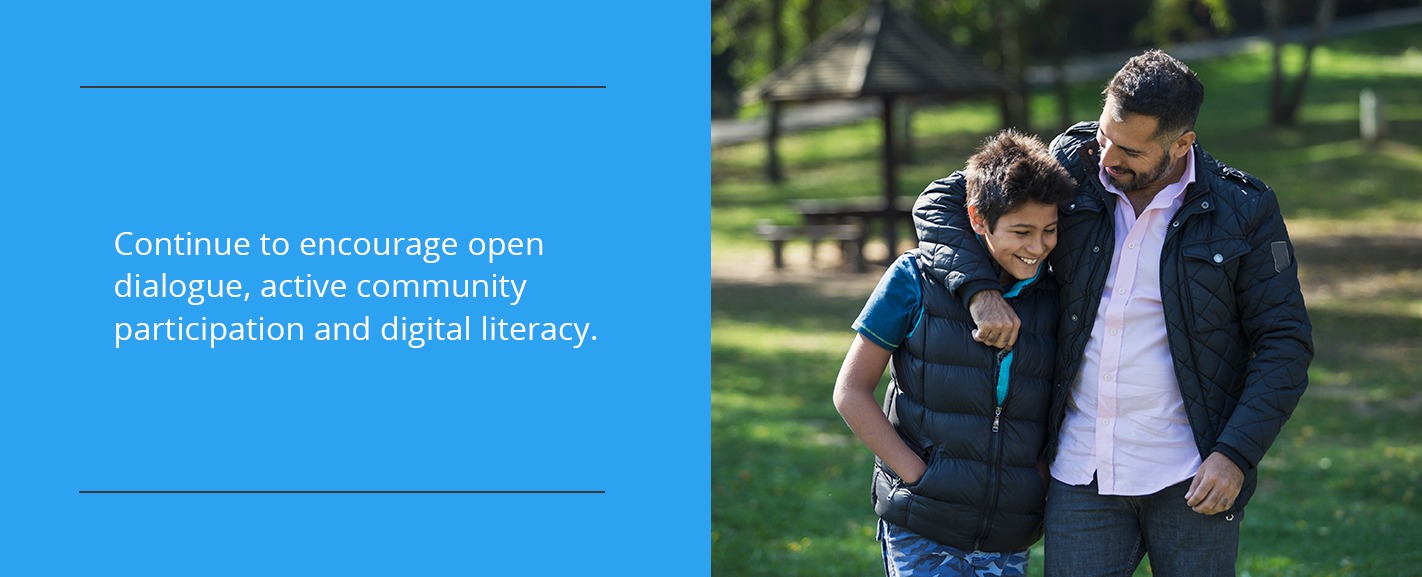
Talking to High Schoolers About Politics
Teaching teenagers about politics doesn’t end in high school, although some parents may be tempted to allow their children’s civics teachers to jump in and take over. As important as classroom content is, parents continue to play an important role. During high school, kids have the opportunity to learn how to respect and understand the different viewpoints that make up their local community, as well as their state and nation. The best way to do this is to expose kids to a variety of different perspectives, both past and present. Social studies curricula can help in this area by teaching about past issues and the perspectives of those who were involved. But parents can also help to foster this by encouraging their kids to get to know and understand those around them. At this age, it isn’t enough to talk to a teenager about politics. They need to be encouraged to act! As kids become more independent, they are also more capable of engaging in their community at all levels. They can volunteer at a local charity or school. They can participate in political rallies and voting drives. And, although they cannot vote until they turn 18, high school-aged kids can provide rides for older or disabled adults who need help getting to the polls on election day. Family discussions are also a great place to talk to a high schooler about politics. Parents can ask questions like:
- What issues do you care about the most?
- Do those issues impact you, your family, or a neighbor?
- Who gets left out by your focus on that issue?
- How could your answer to those questions impact your society as a whole?
At this age, parents can also model what it looks like to be a gracious winner and loser. When election season rolls around, sometimes their candidate or issue will win. Other times, it won’t. The way adults react when those wins and losses happen goes a long way toward teaching kids how to respond. It also teaches them how to handle their beliefs with grace and poise even when others feel differently.
How to Speak to Your Child after a Divisive Political or Historical Moment
As children grow, they are likely to be witnesses to various historical events that may be unprecedented. While these events can be both positive or negative, the positive moments in history are usually the easiest to discuss, and the ones that will most likely be spoken about in schools. It’s the harder, more divisive moments that occur that can be more challenging to speak to children about. Schools will often avoid discussing these events, for fear of coming off as partisan or offending any groups on either end of the political spectrum. Therefore, much of the responsibility to help children understand such events, falls on the family of the child. As discussed above, the conversations will need to be managed based on what is both age and maturity-appropriate for your child. However, it is important to help your child ask questions about what occurred, and guide them towards understanding the motives of all sides of the conflict. This doesn’t mean finding ways to agree with all sides or justify both sides. The goal is to help your child recognize that a person or group of people feel aggrieved and make decisions based on those feelings. Ask your child how they believe the situation should have been handled, and what could have been done better on either side of the issue, and then follow up with them to explore how they feel about the events. If they are feeling overwhelmed by the event that occurred, it may be beneficial to utilize community resources or counseling for additional support.
Seek Professional Guidance in the Andover Area
Contrary to popular belief, parents don’t have all the answers. The best way to teach our children to think for themselves is to have a strong sense of self-worth and understanding of what’s important to them. But showing up as a parent starts with taking care of yourself! Based in Andover, MA, Merrimack Valley Psychological Associates offers a range of counseling options designed to address a variety of mental health issues including — but not limited to — anxiety and depression, grief and loss, and stress management. Sometimes people can identify the areas they need to address, but it’s okay if you aren’t sure what you need. Acknowledging that you need help is the most important part. Our team of experienced professionals can help find the right solution for you. Contact us today to set up an appointment for therapy. 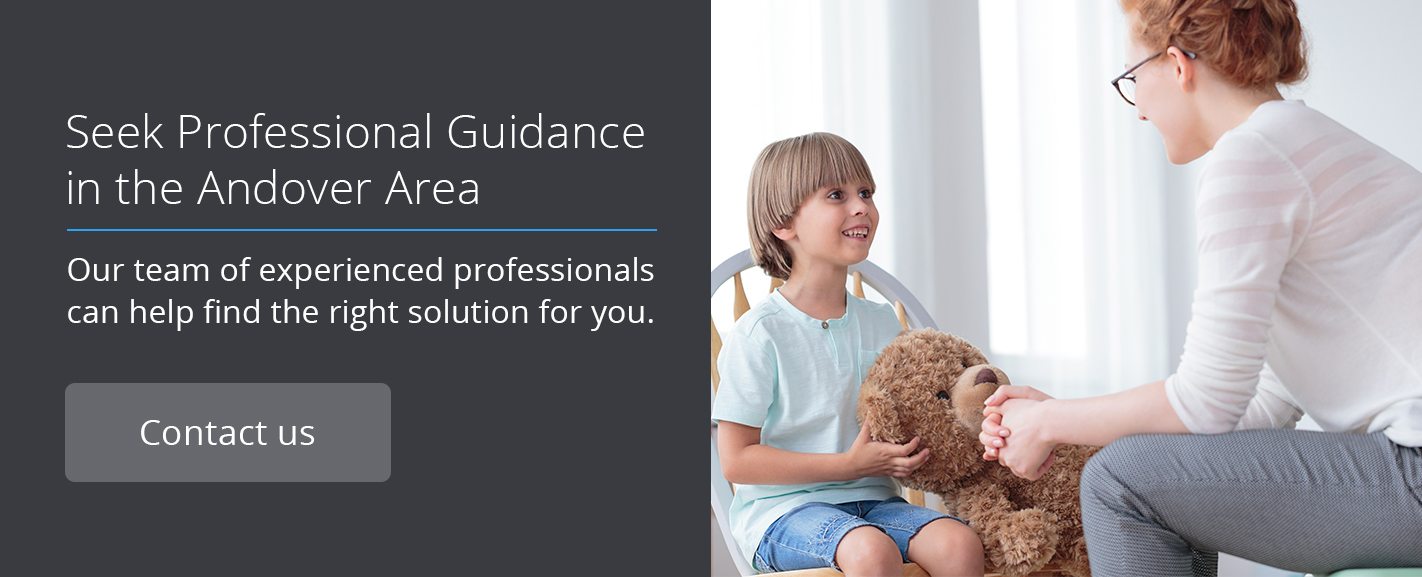
Reviewed By
Dr. David Rainen, PsyD.
I am a licensed clinical psychologist with an extensive background treating a variety of different ages, situations, emotional and mental health disorders in individuals and their families. As part of my 10 year professional and training career in psychology, I have developed and refined my skills and approaches through my work in a variety of diverse settings including: hospitals, community outpatient facilities, college counseling centers, secure and unsecure inpatient/residential treatment programs, and therapeutic day schools.

